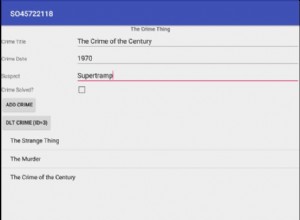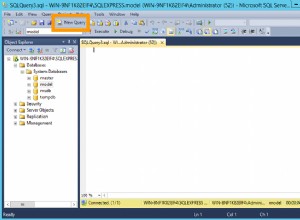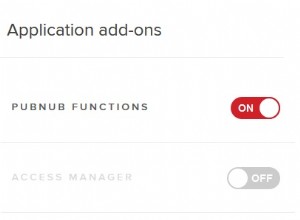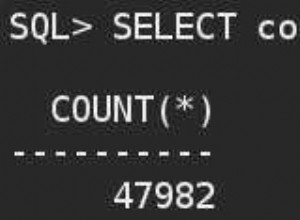Ici, je donne un exemple pour envoyer JSON et un fichier Zip au REST service Web utilisant Oracle UTL_HTTP post multipart/form-data.
Au départ, j'ai pris l'exemple de code du blog de Nick Buytaert, puis je l'ai modifié pour incorporer le JSON et le fichier Zip.
Envoyer JSON et un fichier Zip au service Web REST en utilisant UTL_HTTP
Le code PL/SQL suivant fera le REST l'authentification du service Web à l'aide du jeton. Et après cela, il obtiendra le JSON et le BLOB de la table. Il va compresser le BLOB puis combinez-le avec le JSON en le convertissant en base64 données de type. Ensuite, il préparera l'en-tête et l'enverra.
declare
l_attachment blob;
l_newline varchar2(50) := chr(13) || chr(10);
lco_boundary constant varchar2(30) := 'gc0p4Jq0M2Yt08jU534c0p';
l_http_request utl_http.req;
l_request_body clob;
l_request_body_length number;
l_req_body clob;
l_http_response utl_http.resp;
l_response_header_name varchar2(256);
l_response_header_value varchar2(1024);
l_response_body varchar2(32767);
l_offset number := 1;
l_amount number := 2000;
l_buffer varchar2(2000);
l_clob clob;
l_token varchar2(32767);
begin
-- get the token
l_clob := apex_web_service.make_rest_request(
p_url => 'https://YourTokenURL',
p_http_method => 'GET');
l_status := apex_web_service.g_status_code;
APEX_JSON.parse(l_clob);
l_token:=APEX_JSON.get_varchar2(p_path => 'token');
-- prepare or get the json
l_req_body := '{name: "Scott", age: 33, city: "Huston"}';
l_request_body := l_newline
|| '--' || lco_boundary || l_newline
|| 'Content-Disposition: form-data; name="contact-info"' || l_newline
|| 'Content-Type: application/json' || l_newline
|| l_newline
|| l_req_body; --|| l_newline
--|| '--' || lco_boundary || '--';
-- get the blob from the table and zip it
FOR l_file IN (
SELECT
file_name,
my_file_blob
FROM
my_doc_table
WHERE
doc_id = '1234'
) LOOP
apex_zip.add_file(p_zipped_blob => l_attachment, p_file_name => l_file.file_name,
p_content => l_file.my_file_blob);
END LOOP;
apex_zip.finish(p_zipped_blob => l_attachment);
-- concatenate zip file as base64 data to the above json
l_request_body := l_request_body || l_newline
|| '--' || lco_boundary || l_newline
|| 'Content-Disposition: form-data; name="attachment"' || l_newline
|| 'Content-Type: application/zip' || l_newline
|| 'Content-Transfer-Encoding: base64' || l_newline
|| l_newline
|| apex_web_service.blob2clobbase64(l_attachment) || l_newline
|| '--' || lco_boundary || '--';
dbms_output.put_line('Request body>');
dbms_output.put_line(dbms_lob.substr(l_request_body, 4000, 1));
l_request_body_length := dbms_lob.getlength(l_request_body);
-- authenticate wallet
utl_http.set_wallet(
path => 'file:/your/wallet/path',
password => 'YourWalletPsw'
);
-- start sending the data
l_http_request := utl_http.begin_request(
url => 'https://yourRESTservicePostURL',
method => 'POST',
http_version => 'HTTP/1.1'
);
-- set header
utl_http.set_header(l_http_request, 'Authorization', 'Bearer ' || l_token);
utl_http.set_header(l_http_request, 'Content-Type', 'multipart/form-data; boundary="' || lco_boundary || '"');
utl_http.set_header(l_http_request, 'Content-Length', l_request_body_length);
utl_http.set_header(l_http_request, 'Transfer-Encoding', 'Chunked');
utl_http.set_header(l_http_request, 'Connection', 'keep-alive');
-- send data in chunks
while l_offset < l_request_body_length loop
dbms_lob.read(l_request_body, l_amount, l_offset, l_buffer);
utl_http.write_text(l_http_request, l_buffer);
l_offset := l_offset + l_amount;
end loop;
-- print the response
l_http_response := utl_http.get_response(l_http_request);
dbms_output.put_line('Response> Status Code: ' || l_http_response.status_code);
dbms_output.put_line('Response> Reason Phrase: ' || l_http_response.reason_phrase);
dbms_output.put_line('Response> HTTP Version: ' || l_http_response.http_version);
for i in 1 .. utl_http.get_header_count(l_http_response) loop
utl_http.get_header(l_http_response, i, l_response_header_name, l_response_header_value);
dbms_output.put_line('Response> ' || l_response_header_name || ': ' || l_response_header_value);
end loop;
utl_http.read_text(l_http_response, l_response_body, 32767);
dbms_output.put_line('Response body>');
dbms_output.put_line(l_response_body);
if l_http_request.private_hndl is not null then
utl_http.end_request(l_http_request);
end if;
if l_http_response.private_hndl is not null then
utl_http.end_response(l_http_response);
end if;
exception
when others then
if l_http_request.private_hndl is not null then
utl_http.end_request(l_http_request);
end if;
if l_http_response.private_hndl is not null then
utl_http.end_response(l_http_response);
end if;
raise;
end; Ce code fonctionne comme un charme. S'il vous plaît laissez-moi savoir dans la section des commentaires si vous avez des problèmes.




